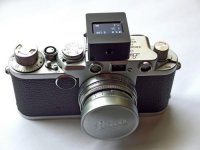Forest_rain
Well-known
Vivitar 24 light meter. Bought a CDS meter instead of selenium and it's shoe mounted, which is nice, but it covers the shutter speed dial so I can't see/change the shutter speed. Solutions?
Maybe I just need to raise the cold shoe up a little bit with a cold shoe mount (male) with cold shoe bracket (female) on the top, so I can access the shutter speed dial? Any suggestions?
BTW this is a Canon III. Can the leicameter meters with the built in shutter speed dial work with the canon models?
Maybe I should have just gotten a L-208 instead of trying to save a few bucks buying a vintage meter :/

Maybe I just need to raise the cold shoe up a little bit with a cold shoe mount (male) with cold shoe bracket (female) on the top, so I can access the shutter speed dial? Any suggestions?
BTW this is a Canon III. Can the leicameter meters with the built in shutter speed dial work with the canon models?
Maybe I should have just gotten a L-208 instead of trying to save a few bucks buying a vintage meter :/




